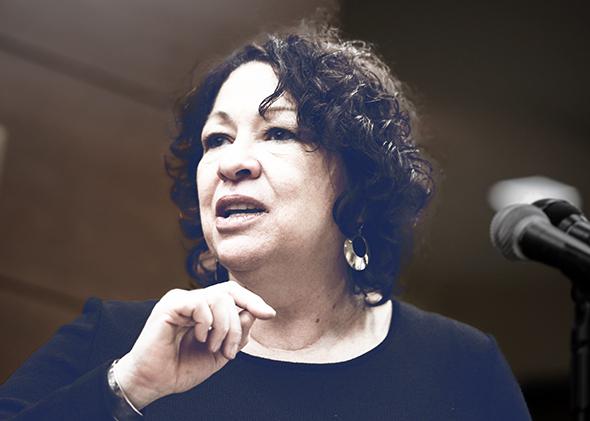In a dispatch on King v. Burwell, the closely watched Obamacare challenge, NPR’s Nina Totenberg observed that the plaintiffs’ attorney, Michael Carvin, argued before the Supreme Court with “red-faced passion.” Indeed, Justice Sonia Sotomayor hadn’t even finished the preamble to her first question when Carvin interrupted her to finish an earlier thought. He then caught himself and apologized, at which point Sotomayor tempered him: “Take a breath.”
Carvin needed that moment, because Sotomayor was about to ask a bombshell question about federalism, a subject that later dominated a key portion of the hearing. In setting it up, she said she was “concerned” by Carvin’s reading of the Affordable Care Act—in essence, that Congress wrote it so that only states with their own insurance exchanges receive federal subsidies. The problem with that reading, Sotomayor noted, is that lawmakers gave states a “choice”: set up exchanges of your own, or let the federal government do it for you via healthcare.gov.
That choice is not at issue in King. The dual system of federal and state exchanges is a feature of the law. And to Sotomayor, this choice cannot be squared with Carvin’s interpretation that tax subsidies are available only to people participating in state-run exchanges. That’s a constitutional problem. “If we read it the way you’re saying,” she said, “then we’re going to read the statute as intruding on the federal-state relationship, because then the states are going to be coerced into establishing their own exchanges.”
That’s the bombshell. Because if Carvin is correct and a state chooses not to set up its own exchange—and thus loses federal subsidies—Sotomayor said, “we’re going to have the death spiral that this system was created to avoid.” And she went on to list the parade of horribles that would follow from this so-called choice, including destabilized insurance markets and skyrocketing premiums. “Tell me how that is not coercive in an unconstitutional way?” Sotomayor asked.
The question captivated Justice Anthony Kennedy, the perceived swing vote in this case. A number of outlets rightfully placed the fate of Obamacare in his hands. One wonders how things would’ve played out Wednesday had Sotomayor not broached the issue in such stark terms. “Death spiral,” after all, is the kind of thing that grabs headlines and is sure to grab the justices—Kennedy himself brought it up later—when they cast their preliminary votes in King, which could happen as soon as their private Friday conference.
But Sotomayor wasn’t done. She curiously name-dropped a case that has twice reached the Supreme Court in recent years, Bond v. United States. The case had nothing to do with health care, but its two iterations did offer grand pronouncements on federalism—a constitutional principle respecting the dividing line between federal and state governments. More interesting still, the first Bond decision was authored by Kennedy and the second Bond decision was authored by Chief Justice John Roberts, who provided the vote that saved Obamacare in a previous case, NFIB v. Sebelius, and who is the other possible swing vote in this case. In their Bond decisions, both had very thoughtful things to say about the proper balance between federal power and state autonomy. Seizing on that principle, Sotomayor continued, “We said [in Bond] that it is a primary statutory command that we read a statute in a way where we don’t impinge on the basic federal-state relationship.”
Those words must have been music to Kennedy’s ears because he later ran with them and pressed Carvin in his pensive, considered style: “It seems to me that under your argument, perhaps you will prevail in the plain words of the statute; there’s a serious constitutional problem if we adopt your argument.”
This “serious constitutional problem” was easily one of the most quoted Kennedy lines from Wednesday. But for Kennedy, the federalist, it is also an untenable result that needs to be reconciled if Obamacare is to survive. That is, the law needs to be read so as to not deal a blow to the states. And for Roberts, this blow is akin to the “gun to the head” of the states that he expressly condemned in NFIB v. Sebelius in 2012. Under this principle, the position of Carvin and the King challengers falls apart. It is simply “not a rational choice for the states to make,” Kennedy later told Solicitor General Donald Verrilli. And because state coercion is unacceptable under the Constitution, Kennedy suggested that “constitutional avoidance” counsels adopting the federal government’s view of the statute: that Obamacare provides subsidies for all, even those states that chose not to set up their own health care exchanges.
So yes, the fate of Obamacare now rests with Kennedy. Or with Roberts. Or both. But let’s also credit Sotomayor for finding a way to corner them both and hold them to precedents the Supreme Court has long believed in.
